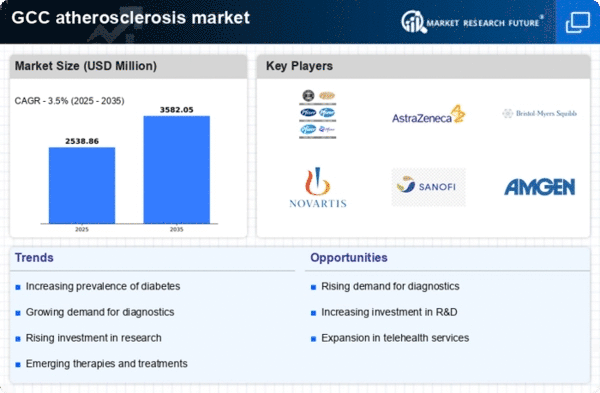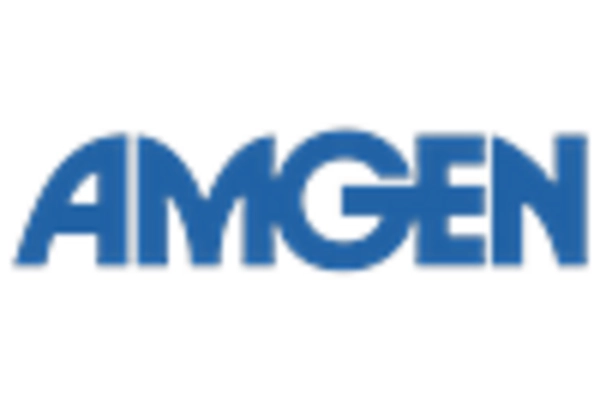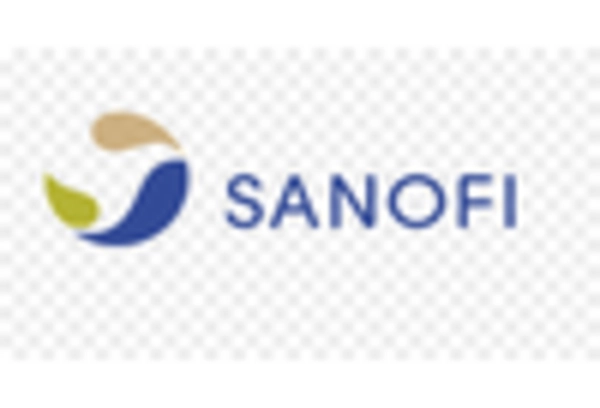Growing Geriatric Population
The growing geriatric population in the GCC is a significant driver for the atherosclerosis market. As life expectancy increases, the prevalence of age-related diseases, including atherosclerosis, is likely to rise. Current demographic trends indicate that the proportion of individuals aged 65 and older is expected to increase by approximately 20% over the next decade. This demographic shift necessitates a greater focus on cardiovascular health, as older adults are at a higher risk for atherosclerosis and its complications. Consequently, healthcare providers will need to develop tailored treatment strategies to address the unique needs of this population. As a result, the atherosclerosis market is anticipated to experience robust growth, driven by the demand for specialized care and innovative treatment options.
Rising Awareness and Education
Increased awareness and education regarding cardiovascular health are pivotal drivers for the atherosclerosis market. Public health campaigns and educational initiatives aimed at promoting heart health have gained momentum in the GCC. These efforts are crucial in informing the population about the risks associated with atherosclerosis and the importance of early detection and management. As awareness levels rise, individuals are more likely to seek medical advice and undergo screening, leading to an uptick in diagnostic procedures and treatment options. This shift is expected to contribute to a market growth rate of approximately 8% over the next few years. Consequently, the atherosclerosis market stands to benefit from a more informed patient population actively engaging in their health management.
Advancements in Medical Technology
Technological advancements in medical devices and treatment methodologies are significantly influencing the atherosclerosis market. Innovations such as minimally invasive surgical techniques, advanced imaging technologies, and novel drug delivery systems are enhancing the diagnosis and treatment of atherosclerosis. For instance, the introduction of drug-eluting stents has revolutionized interventional cardiology, leading to improved patient outcomes. The GCC region is witnessing a surge in the adoption of these technologies, with market analysts projecting a growth rate of around 10% annually. This trend not only enhances the efficacy of treatments but also increases the accessibility of care, thereby driving the overall market forward. As healthcare systems invest in cutting-edge technologies, the atherosclerosis market is poised for substantial growth.
Government Regulations and Policies
Government regulations and policies play a significant role in shaping the atherosclerosis market. In the GCC, regulatory bodies are increasingly focusing on establishing guidelines for the prevention and management of cardiovascular diseases. These regulations often include incentives for healthcare providers to adopt best practices in treating atherosclerosis. Furthermore, the implementation of policies aimed at reducing risk factors, such as smoking and unhealthy diets, is likely to create a more favorable environment for market growth. As governments allocate resources to combat cardiovascular diseases, the atherosclerosis market is expected to expand, driven by increased funding for research and development, as well as enhanced healthcare infrastructure.
Increasing Incidence of Atherosclerosis
The rising incidence of atherosclerosis in the GCC region is a critical driver for the atherosclerosis market. Factors such as sedentary lifestyles, unhealthy dietary habits, and increasing obesity rates contribute to this trend. Recent studies indicate that the prevalence of atherosclerosis-related conditions has surged by approximately 15% over the past five years. This alarming increase necessitates enhanced diagnostic and therapeutic solutions, thereby propelling market growth. As healthcare providers focus on managing this condition, the demand for innovative treatment options, including advanced pharmaceuticals and medical devices, is expected to rise. Consequently, the atherosclerosis market is likely to experience significant expansion as stakeholders seek to address the growing burden of this disease.
















